Bridges and dentures have both been used by dentists to replace teeth for a very long time, and they both continue to be a reliable option for those who have gaps in their grins. That said, when it comes to modern dental solutions, nothing beats dental implants when it comes to fully restoring smiles. These titanium posts can set an extremely sturdy foundation for any number of replacement teeth. To learn more about the procedure and whether you’re a good candidate, schedule a consultation to discuss options to replace missing teeth with dental implants in Englewood, FL at Davis, Boeller & Rife Dental today.

A dental implant is in the form of a small metal post or screw. It’s typically made out of titanium, which is a highly biocompatible metal that the bone can fuse with through osseointegration. Once an implant has joined with your jaw, it can fulfill all the functions of a natural tooth root while providing sturdy support for a dental crown, bridge, or denture. The number of dental implants you get will vary depending on the extent of your tooth loss.

There are many reasons why dental implants are well worth the investment. For starters, they have a lifespan that can reach well over 35 years with the right care, meaning they last far longer than other tooth replacements. Because they fuse with the bone and are topped with customized restorations, they can very closely mimic the look and feel of your natural teeth. Also, implants help preserve the density of the jawbone, preventing it from breaking down.

Dental implants are appropriate for anyone who has lost any number of teeth and still has a healthy mouth with sufficient bone density to support the posts. We can take X-rays of your smile and determine whether any preparatory procedures might be necessary to prepare you for implant surgery. This is also our chance to determine what kind of implants you need. Different patients are going to need to undergo slightly different procedures depending on their situation.
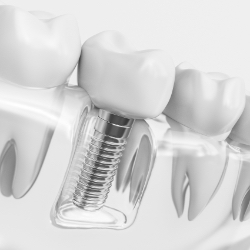
If just one tooth is lost, then a single dental implant can be placed in the gap and topped with a crown. Filling in the empty space this way prevents your remaining natural teeth from drifting out of alignment over time and causing further oral health problems later on in life.
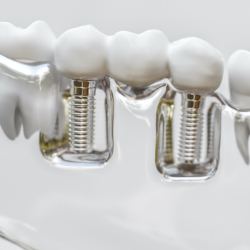
A traditional dental bridge requires us to make permanent changes to your natural teeth, removing some of the enamel to make room for the restoration itself. To preserve your teeth, we can place a bridge on a pair of implants instead in order to replace multiple teeth in a row.
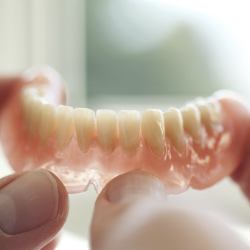
If you already have full dentures, you’re probably familiar with the inconvenience of having your teeth slip out of place or gradually lose their fit over time. Dental implants help prevent both of these problems, and they give your new teeth much more bite strength and stability so that you can eat whatever you want.
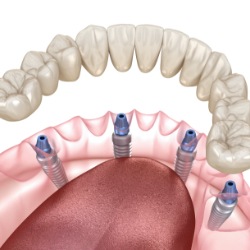
With a normal implant procedure, it might take 6 or 8 implants to support dentures. All-on-4 can significantly simplify the treatment by allowing us to place your new teeth on 4 strategically placed posts. Thanks to this technique, it’s often possible to place temporary dentures right away instead of waiting for your mouth to heal.
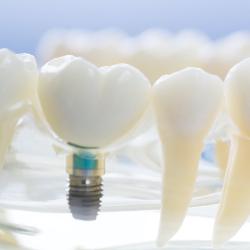
If your jawbone has already degraded to the point where it can’t support a normal dental implant, we can sometimes avoid the need for bone grafts by placing mini dental implants. Since they’re shorter than traditional implants, they can be placed without complex flap surgery and allow for shorter healing time.

True enough, dental implants can keep your smile complete and robust for a lifetime. They wouldn’t be the gold standard of tooth replacements otherwise! Still, the prosthetics only work when you take good care of them. They’ll fail or need switching out if you don’t protect them from damage and oral issues. Fortunately, our office has some helpful tips for dental implant care in Englewood. Just keep reading to learn them and ensure your newly rebuilt smile lasts.

Ultimately, implants can’t get cavities. They’re artificial and thus not natural parts of your mouth. However, you still need to clean them daily so they stay functional.
You see, implants are placed next to your natural teeth and gums. That means they’re affected by nearby oral problems. For instance, gum disease can cause gum recession – a condition that may loosen your implant. Similarly, the infection might erode the bone tissue supporting your prosthetic.
Given these facts, you’ll want to prioritize oral care. In particular, remember to brush twice daily, floss once daily, and rinse with mouthwash often. These practices will keep your mouth healthy enough to support implants.

While implants will let you eat as you please, you should stick to a healthy, mouth-friendly diet. Doing so greatly reduces your risk of implant failure.
The fact is that some foods are hazardous for implants. For example, hard pretzels and nuts can chip or break them. On the other hand, sticky and sugary stuff can wedge between implants and decay nearby teeth. They’d then cause oral issues that threaten your prosthetics.
In contrast, soft foods with many nutrients help implants last. Items with calcium, phosphorus, and vitamin C, especially, are very good – they prevent gum disease and strengthen the jaw.

Among other things, bad oral habits can cause implants to break or fail. Therefore, quitting them before or soon after treatment is in your best interest.
One such habit to quit is smoking. After all, tobacco slows your recovery from implant surgery. It also encourages gum disease, leading to implant failure.
Meanwhile, another practice to stop is chewing hard objects. Biting things like fingernails or ice cubes can chip implants.

Implants may be durable, but they aren’t indestructible. They’ll break or stop working when hit with enough force. That being the case, strive to protect them with good dental tools.
As you might expect, an oral appliance is the best protection for implants. A sports mouthguard would shield the restorations from injuries and player collisions. As you sleep, a nightguard could also prevent implant damage from bruxism.

Despite your best efforts, you can’t effectively care for implants alone. There’ll always be an issue that you overlook or mishandle. With that said, attend dental checkups and cleanings twice a year. These visits will offer extra implant protection.
Remember, checkups and cleanings diagnose and treat oral issues early. That means they’ll stop problems before an implant threat can emerge. From there, your complete smile is kept safe.

How much will you end up paying for implants? To try and give you a reliable answer to this question, we will carefully examine your mouth and consider:
We’ll talk to you about the costs related to the different phases of implant treatment and make sure you understand what to expect. If you have insurance, the implants themselves might not be covered, but other aspects of the treatment could be. We’ll go over your benefits with you to see what kind of coverage you can expect.

Dental implant failure is unusual but not impossible. If there’s any indication that your smile could be at risk due to a problem with your dental implants, we can help. Give our office a call to schedule a consultation and begin the dental implant salvage process. We’ll try to save your dental implants if we can, and you can count on us to do whatever is necessary to keep your entire smile safe.